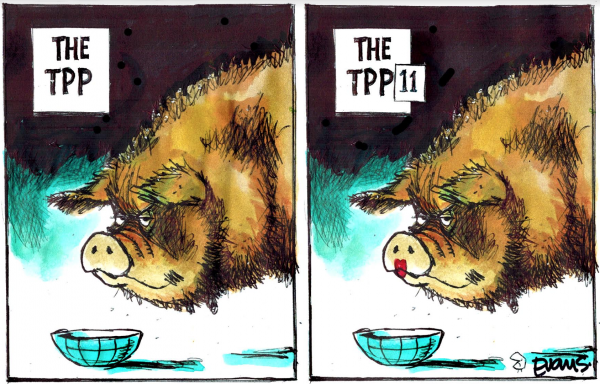The
argy-bargy over America's proposed tariffs on steel and aluminium is
set to briefly take a back seat as 11 nations sign the Trans-Pacific
Partnership trade pact.
Trade
Minister David Parker will join his counterparts from 10 Pacific
countries for the signing ceremony in Chile on Thursday.
The
deal had been on life support after the United States' withdrawal but
was resuscitated in January.
The
deal will eliminate 98 percent of tariffs in a marketplace worth
close to $14 trillion.
Mr
Parker said the deal would give Kiwi businesses preferential access
to Japan - the third biggest economy in the world - Canada, Mexico
and Peru for the first time.
The
deal had also "increased in importance because of growing
threats to the effective operation of the World Trade Organisation",
he said.
According
to the Ministry of Foreign Affairs and Trade's estimates, the deal is
expected to give a $1.2 billion to $4b boost to New Zealand's real
gross domestic product.
This
included almost $86 million in expected tariff savings for the dairy
industry, while the country's exporters would save about $200m in
reduced tariffs to Japan alone.
Fast
facts about the Trans-Pacific Partnership 11:
The
TPP 11 includes Australia, Brunei, Canada, Chile, Japan, Malaysia,
Mexico, New Zealand, Peru, Singapore and Vietnam.
US
President Donald Trump pulled America out of the deal a year ago
after describing it as "a continuing rape of our country".
The
TPP was a key policy of the former Obama administration's so-called
foreign policy pivot to Asia.
Some
opponents of the TPP fear it opens doors for companies to sue
governments for policies that harm their investments. The deal has a
controversial investor-state dispute settlement clause.
China
isn't part of the TPP and is trying to get up a rival deal with seven
TPP countries, including New Zealand, and eight others. The Regional
Comprehensive Economic Partnership is much narrower and less
ambitious than the TPP.
Let’s
be clear – when Labour & NZ First sign the TPPA this week –
it will be as cheap traitors for less than 30 pieces of silver
This
deal is for those corporate interests who wish to exploit the
pristine base products we produce, it is not about us protecting our
future
By
Martyn Bradbury

7
March, 2018
In
the week Labour and NZ First sign the TPPA, let’s ask agin who is
the TPPA for?
Is
it for NZ or for corporate power trumping domestic political
sovereignty?
It
is without a doubt the latter and not the former.
The
reason this is still being rammed through is testament to the truth
that the Ministries run this Government and it is not the Government
in charge of the Ministries.
Let’s
be crystal clear. This is NOT a trade deal, it could have been,
there’s a chance to fight it tooth and nail through the
parliamentary process until it is, but right now it is not a trade
deal.
Let’s
be crystal clear. This is NOT a trade deal, it could have been,
there’s a chance to fight it tooth and nail through the
parliamentary process until it is, but right now it is not a trade
deal.
This
is about corporate
power over domestic political sovereignty.
This
is about the ability of our Government to pass legislation with the
constant threat of being sued.
And
how much are we getting to sell our souls to our Corporate Overlords?
What
is the price of the 30 pieces of silver we are gaining for this
capitulation to our own political Tino rangatiratanga?
In
20 years the TPPA will have given us .3%-1% growth in GDP,
that is the fucking pathetic price we are prepared to sell ourselves
out for…
Little
economic benefit
The
National Interest Analysis (NIA) reveals that the economic benefits
of TPP-11 will be small, even if some of the exaggerated assumptions
are included. The NIA estimates overall benefits will be only 0.3 –
1.0% growth in GDP by the time the TPP is fully implemented, in 20
years’ time.
This
compares with a GDP growth of 61% in 20 years’ time without TPP-11
(using Treasury long term forecasts).
The
headline from the media that there would be up to $4bn benefit from
the TPP-11 uses exaggerated assumptions and ignores the timeframe. In
reality, an additional 0.3 – 1.0% by 2038 from TPP-11 is a very
small benefit.
This
is shown in the data:
- Tariff reductions of $222m per year are 0.4% of overall exports and 1.1% agricultural exports
- They are mainly concentrated in commodities, rather than in value-added processed goods or complex manufacturers that are important to our economic future
- Tariff reductions for dairy and beef fall short of the ‘gold standard’ treaty originally promised
- Tariff reductions for dairy are 0.7% of overall dairy exports
The
argument in the NIA that exports to China grew after we signed an FTA
ignores the context. There was huge growth in commodity exports from
Australia, Brazil and other exporters to China, whether or not they
had signed an FTA. It is disingenuous to claim this as a likely
scenario for exports under TPP-11.
…how
spineless is that?
We
are selling out for commodity exports with no added value and no
future agency.
This
deal is for those corporate interests who wish to exploit the
pristine base products we produce, it is not about us protecting our
future.
On
a planet with trade wars, economic crashes and environmental
apocalypses looming we need to have our hand firmly on the tiller of
the nation, this deal allows over seas interests to direct our hand.
It
is not acceptable.
It
must be fought.
Labour
and NZ First have had enough time, they can’t be excused any
longer.



No comments:
Post a Comment
Note: only a member of this blog may post a comment.